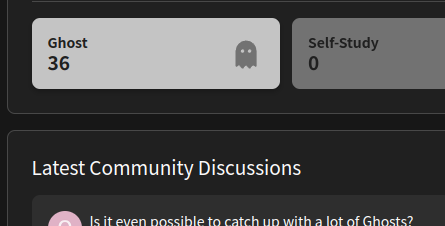That person had a bit of a special case, having taken a long break from BP, and most of their ghosts were coming from vocab that had previously been at a fairly high level, but they’d forgotten/got-rusty-on due to the long break.
For someone who’s been using BP steadily for a while, the pattern of ghosts will be different: Most of them will be due to learning new grammar, and occasionally from older grammar (the occasional mistake) and so-called ‘leeches’ (items that persistently trip you up and keep getting wrong).
I like this question. It’s a good one, and one I haven’t really fully considered before. And yet, I seem to already have a pretty strong opinion of what I think is the ‘right answer’. (Of course there’s no ‘right answer’; I’m just trying to express how ‘certain’ I feel about this answer. I don’t (yet) have strong reasons why I think it’s actually right.  )
)
The ‘right answer’, according to my opinion ( ) is:
) is:
“No more than twice the number of Beginner items you currently have.”
- If you have fewer than twice your current Beginner count, you’re ‘good’.
- If you have more, you ‘should’ stop doing new Lessons until your Ghost count settles back down to less than twice your Beginner count.
Why? Off the top of my head, the reason that comes to mind is that I think of Ghosts as signs from my Review stack to, “Slooooow right down there, Bucko!” In other words, if I’m generating lots of Ghosts, it’s because I don’t have a good grasp of the current grammar I’m spending time reviewing. So, instead of ‘learning’ more with new Lessons, I should just stick with actually learning the ones I’m having trouble with.
On the other hand, it’s okay to have ‘lots’ of Ghosts (even up to twice your Beginners) because they only go up to Ghost-SRS level 4, which (IIRC) is about a 2-day interval. So, after about 4 days – assuming the Ghosts aren’t from ‘leeches’ – you should be able to clear them all out (while perhaps generating a few new ones from other Reviews along the way).
In other words, unlike full Review items, they don’t accumulate in the long term. So, you can ‘easily’ clear all your Ghosts within less than a week (if you were to focus solely on clearing your Ghosts). So, therefore, having ‘a lot’ of Ghosts is not nearly as much of a problem as having (for example) too many new Lessons.
Also, Ghosts will automatically slow down your regular Reviews – at least in comparison to the ‘extra study’ you’re doing by re-reviewing ghosts. So, even if you have ‘lots’ of Ghosts, they will naturally ‘hold back’ and ‘slow down’ how much you’re reviewing full Grammar points.
In other words, they’re like a ‘brake’ on your reviewing of full Grammar points. And the fewer full Grammar points you’re reviewing, the fewer new Ghosts you’ll generate. It’s like a negative feedback system.
Too many Grammar points → More Ghosts generated → More time spent on Ghosts instead of Grammar points → Less time on Grammar points → Fewer Ghosts generated.
The important thing to remember, though, is not just to allow Ghosts to slow down your Reviews (which they will do automatically), but to also use Ghosts as a signal to yourself to slow down on new Lessons, which you have to manage by resisting the temptation yourself to add new ones.
Last thing: While I say “No more than twice the number of Beginner items you currently have,” this is actually just a ‘default’ upper limit. You may want to actually keep the number of Ghosts quite a bit lower than that. It all depends on your own pacing and ‘taste’ for ghost-busting. But if you have more than double the number of Beginners, then I’d say you’re probably in for some trouble with getting overwhelmed and potentially burnt-out.
But that’s all just off the top of my head. I’m open to being wrong, and hearing other folks’ opinions too.



 )
)